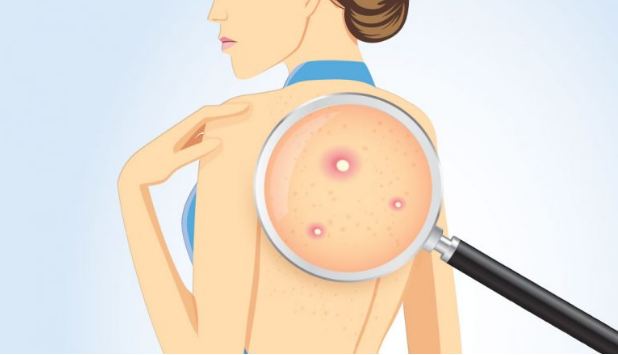Back Acne: Comprehensive Guide on Causes, Symptoms, and 6 Effective Ways to Treat It
Do you often feel uncomfortable or self-conscious because of back acne? Back acne, commonly known as "bacne," is a widespread skin condition that can impact your daily activities. Research shows that approximately 61% of adults experience acne on their back. This article provides complete information on the causes, symptoms, and effective ways to manage back acne.
BODY HEALTHBACK ACNE
11/8/20242 min read


Table of Contents
What is Back Acne?
Causes and Risk Factors
6 Effective Ways to Treat Back Acne
When to See a Doctor
FAQ on Back Acne
What is Back Acne?
Back acne is a skin condition involving red bumps, pustules (pimple-like bumps filled with pus), blackheads, and whiteheads on the back area. Similar to facial acne, back acne occurs when pores become clogged with oil (sebum), dead skin cells, and bacteria.
📝 Read more : Difference Between Blackheads and Acne - A Complete Guide
Causes and Risk Factors
Main Causes:
Excess Oil Production
Increased oil production from the sebaceous glands can clog pores, leading to breakouts.Accumulation of Dead Skin Cells
Dead skin cells that aren't properly removed can block pores.Bacterial Growth
Trapped bacteria, such as Cutibacterium acnes, can trigger inflammation.Pore Inflammation
Inflamed blockages may develop into painful bumps.
Often Overlooked Risk Factors:
🏃♂️ Excessive Sweating
Sweat creates a moist environment conducive to bacterial growth.👕 Tight or Non-Breathable Clothing
Non-breathable materials can trap sweat and oil.💆♂️ Oily Hair Touching the Back
Long or oily hair that rests against the back may worsen acne.🧴 Harsh Cleansers
Using overly harsh soaps or scrubs can irritate the skin.😰 High Stress Levels
Stress can increase hormones that trigger breakouts.🌡️ Prolonged Exposure to Heat
Hot and humid conditions can increase sweat and oil production.
📝 Learn more : Between Stress and Skin Issues
6 Effective Ways to Treat Back Acne
1. Use the Right Body Wash
Choose body wash specifically formulated for acne-prone skin, labeled as "oil-free," "noncomedogenic," or "non-acnegenic."
Pro tip: Look for products containing salicylic acid or benzoyl peroxide to help control breakouts.
2. Apply Topical Treatments
Topical solutions with active ingredients like:
Retinol
Salicylic Acid
Azelaic Acid
Can help reduce acne by opening pores and reducing inflammation.
📝 Also Read: Complete Guide to Choosing the Right Acne Medication
3. Mind Your Clothing Choices
Wear breathable fabrics such as cotton and avoid tight clothing during workouts. Change clothes immediately after sweating.
4. Follow Proper Showering Routine
Effective showering habits to reduce back acne:
Shower immediately after sweating
Use warm water
Gently cleanse the back without scrubbing too hard
Pat skin dry with a clean towel
5. Protect From UV Exposure
Apply sunscreen labeled "non-comedogenic" with a minimum SPF of 30 when outdoors. Reapply every 2-3 hours for optimal protection.
6. Maintain Cleanliness of Personal Items
Ensure you:
Change towels every 2-3 days
Wash bed linens weekly
Regularly clean pillowcases
This reduces bacterial transfer to your back and accelerates healing.
When to See a Doctor?
Consult a dermatologist if:
Acne doesn't improve after 8-12 weeks of self-care
There is intense pain or signs of infection
Deep scars or stubborn acne lesions persist
FAQ on Back Acne
Q: Can back acne be completely cured?
A: With consistent care and preventive measures, back acne can be managed and controlled.
Q: Is it okay to pop back acne?
A: Avoid popping as it can lead to infection and scarring.
Struggling with back acne? Discover the best skin care solutions for fast and effective results in here
